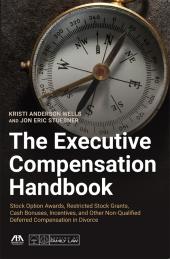We are in the process of migrating the LexisNexis Store. During this transition, some customers may not be able to access their Download Center or new electronic orders. Please call Customer Service 1-800-833-9844 or Chat With A Support Representative <https://supportcenter.lexisnexis.com/app/chat/store_chat/>
The Executive Compensation Handbook: Stock Option Awards, Restricted Stock Grants, Cash Bonuses, Incentives and Other Non-Qualified Deferred Compensation in Divorce
Select a format
 International Order Inquiry
International Order Inquiry
Select subscription type
Terms & conditions
Subscribers receive the product(s) listed on the Order Form and any Updates made available during the annual subscription period. Shipping and handling fees are not included in the annual price.
Subscribers are advised of the number of Updates that were made to the particular publication the prior year. The number of Updates may vary due to developments in the law and other publishing issues, but subscribers may use this as a rough estimate of future shipments. Subscribers may call Customer Support at 800-833-9844 for additional information.
Subscribers may cancel this subscription by: calling Customer Support at 800-833-9844; emailing customer.support@lexisnexis.com; or returning the invoice marked "CANCEL".
If subscribers cancel within 30 days after the product is ordered or received and return the product at their expense, then they will receive a full credit of the price for the annual subscription.
If subscribers cancel between 31 and 60 days after the invoice date and return the product at their expense, then they will receive a 5/6th credit of the price for the annual subscription. No credit will be given for cancellations more than 60 days after the invoice date. To receive any credit, subscriber must return all product(s) shipped during the year at their expense within the applicable cancellation period listed above.
The total price includes the product(s) listed in the Order Form and any Updates for a limited period (minimum period of 30 days) after the order is placed ("Order Window"). Shipping and handling fees are not included in the grand total price.
All shipments may be returned, at subscribers' expense, for full credit of the Price within 30 days of receipt.
Shipments may not be returned, and no credits will be issued, more than 30 days after receipt.
After the Order Window, subscribers will receive notice of Updates along with the then-current grand total price and order process as Updates become available. Subscribers will only be shipped those Updates they specifically request.
Product description
Executive compensation can include stock options, restricted stock, restricted stock units, phantom stock, stock appreciation rights, longterm incentive plans, short-term incentive plans, cash bonuses, and supplemental executive retirement plans, among a myriad of other arrangements. This book looks at the executive compensation options where the benefit is in the category of nonqualified deferred compensation, providing guidance to enable family law practitioners to understand and navigate issues that arise with respect to deferred compensation.
Topics addressed in The Executive Compensation Handbook include:
- The most common types of executive compensation
- Where to find essential information
- What constitutes property
- Separate versus marital property
- Valuation
- Issues in dividing assets
- Using executive compensation for support purposes
- Tax considerations
- Practical drafting tips and techniques
eBooks, CDs, downloadable content, and software purchases are noncancelable, nonrefundable and nonreturnable. Click here for more information about LexisNexis eBooks. The eBook versions of this title may feature links to Lexis+® for further legal research options. A valid subscription to Lexis+® is required to access this content.
 Lexis Nexis
Lexis Nexis 
